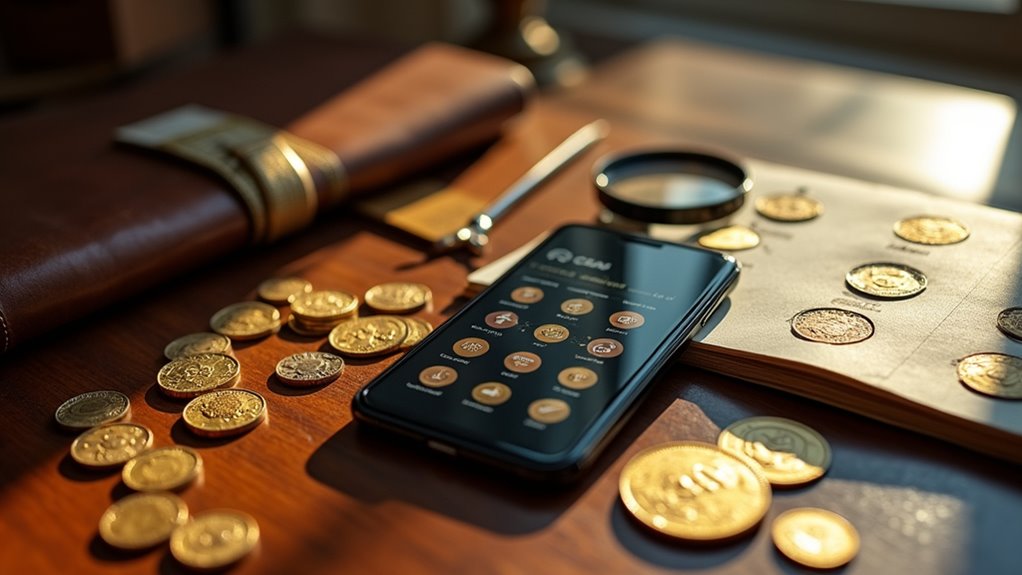Finding a trustworthy coin dealer requires careful evaluation of their professional credentials and reputation. The best dealers maintain memberships in recognised organisations like the Professional Numismatists Guild and American Numismatic Association, demonstrating their commitment to ethical practices. They should possess extensive numismatic knowledge, offer transparent pricing, and provide authentication services. Community recommendations from fellow collectors and the dealer’s history of dispute resolution are essential factors. There’s much more to take into account when choosing your numismatic partner.

When seeking to invest in precious coins, finding a reputable coin dealer is vital to guaranteeing both the authenticity of purchases and fair market value. The journey begins with thorough research into a dealer’s credibility, focusing on their professional affiliations with respected organisations like the Professional Numismatists Guild and the American Numismatic Association. These memberships often indicate a commitment to ethical practices and industry standards.
A dealer’s expertise in numismatics plays an essential role in establishing their reliability. Experienced dealers possess extensive knowledge of historical context, market trends, and grading practices. They regularly participate in industry events, seminars, and workshops to stay current with market developments and enhance their professional capabilities. Their willingness to share knowledge and educate collectors demonstrates both expertise and dedication to customer service. Understanding how professional grading works can help collectors make informed decisions when evaluating coins. Furthermore, reputable dealers often adhere to gold hallmarking standards to ensure the authenticity of their products. Additionally, the most sought-after ancient gold coins often hold significant historical importance that can enhance their value. Collectors can benefit from knowing that the world of gold numismatics offers a rich tapestry of historical narratives tied to each coin’s origin and significance.
The reputation of a coin dealer within the collecting community offers valuable insights into their trustworthiness. Fellow collectors and numismatic clubs can provide recommendations based on personal experiences. Attending coin shows provides opportunities to observe dealers interacting with clients and assess their professional conduct firsthand. It’s also prudent to investigate any history of disputes or fraudulent activities through professional organisations and public records.
Experienced collectors can guide you to trustworthy dealers, while coin shows reveal how professionals conduct business with integrity.
Quality dealers maintain diverse inventories and offer extensive services beyond buying and selling. These may include appraisals, authentication, and restoration services. They should provide clear warranties and guarantees for purchases, safeguarding customer protection and satisfaction. The best dealers often collaborate with reputable grading services to verify coin authenticity and condition.
Accessibility and transparency are essential characteristics of trustworthy dealers. They should maintain both physical and online presence, offering flexible consultation options for clients. Their pricing structure should reflect current market rates, with all fees and commissions clearly disclosed. Proper documentation, including detailed descriptions and certificates of authenticity, should accompany all transactions.
Ethical standards form the foundation of reputable dealing practices. Legitimate dealers avoid making exaggerated claims about investment returns or offering deals that seem too good to be true. They maintain clear policies for handling disputes and returns, demonstrating commitment to customer satisfaction. Their dedication to preventing counterfeit coins through rigorous authentication measures protects both their reputation and their clients’ investments.
The selection of a coin dealer requires careful consideration of multiple factors, from professional credentials to ethical practices. By thoroughly evaluating these aspects, collectors can establish relationships with dealers who not only provide quality coins but also contribute valuable expertise to their collecting journey. This extensive approach helps guarantee successful and satisfying numismatic investments while minimising risks associated with counterfeit items or unfair pricing. Additionally, understanding the historical and monetary significance of numismatics can further enhance a collector’s decision-making process.
Frequently Asked Questions
How Can I Determine if My Old Coins Have Any Value?
To determine an old coin’s value, collectors should examine key factors like rarity, condition, and historical significance.
Research using reputable coin catalogues or online value guides helps identify mintage numbers and varieties.
The coin’s physical condition, including wear and toning, considerably impacts worth.
Professional grading services can authenticate and assess coins, while monitoring market trends and collector demand provides insights into potential value.
What Security Measures Should I Look for When Buying Coins Online?
When purchasing coins online, key security measures include ensuring the website has HTTPS encryption and a valid security certificate.
Buyers should verify dealer legitimacy through trusted organisations like the ANA and check for clear business credentials.
Using protected payment methods such as PayPal or credit cards provides additional safeguards.
It is crucial to maintain transaction records and avoid sharing excessive personal details.
Third-party security seals from Norton or McAfee offer extra authenticity assurance.
Should I Clean My Coins Before Having Them Appraised?
Cleaning coins before appraisal is strongly discouraged.
The natural patina and surface characteristics of coins are essential elements that professional appraisers use to determine authenticity and value.
Any cleaning attempt, even gentle methods, can permanently damage the coin’s surface and greatly reduce its worth.
The presence of artificial cleaning marks often leads to lower valuations, as collectors prefer coins in their original, uncleaned condition.
How Often Do Coin Prices Typically Fluctuate in the Market?
Coin prices fluctuate based on various market factors, with frequency varying across different segments.
Traditional numismatic coins typically experience slower, more stable price movements compared to modern markets. Price changes often occur around major auctions, market releases, or significant events.
Daily fluctuations are more common in today’s digital age, influenced by online trading platforms and global market participation, though these movements are generally less volatile than cryptocurrency markets.
What Insurance Options Are Available for Valuable Coin Collections?
Collectors have two main insurance options for protecting valuable coins.
Specialised collectibles insurance offers extensive coverage with customisable limits, agreed value or fair market value options, and protection during transit. This type of policy is ideal for collections exceeding $50,000.
Alternatively, homeowner’s insurance provides basic coverage but often has restrictive sub-limits and may not cover shipping. Claims through homeowner’s policies can also impact premiums, making specialised coverage the preferred choice for serious collectors.












